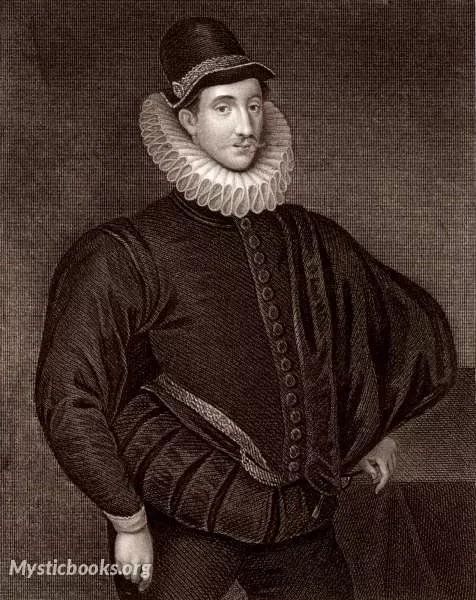
Timeline
Title
Country/Nationality
Fulke Greville
Fulke Greville, 1st Baron Brooke, known before 1621 as Sir Fulke Greville, was an Elizabethan poet, dramatist, and statesman who sat in the House of Commons at various times between 1581 and 1621, when he was raised to the peerage.
Greville was a capable administrator who served the English Crown under Elizabeth I and James I as, successively, treasurer of the navy, chancellor of the exchequer, and commissioner of the Treasury, and who for his services was in 1621 made Baron Brooke, peer of the realm. Greville was granted Warwick Castle in 1604, making numerous improvements. Greville is best known today as the biographer of Sir Philip Sidney, and for his sober poetry, which presents dark, thoughtful and distinctly Calvinist views on art, literature, beauty and other philosophical matters.
Fulke Greville, born 3 October 1554, at Beauchamp Court, near Alcester, Warwickshire.
He was sent in 1564, on the same day as his lifelong friend, Philip Sidney, to Shrewsbury School. He then went up to Jesus College, Cambridge in 1568.
Sir Henry Sidney, Philip's father, and president of the Council of Wales and the Marches, gave Greville in 1576 a post connected with the court of the Welsh Marches, but Greville resigned it in 1577 to go to attend court of Queen Elizabeth I along with Philip Sidney. There, Greville became a great favourite with the Queen, who valued his sober character and administrative skills. In 1581, he was elected in a by-election as Member of Parliament for Southampton. Queen Elizabeth made him secretary to the principality of Wales in 1583. However he was put out of favour more than once for leaving the country against her wishes.
In 1581 at a Whitehall tournament in honour of French ambassadors Greville, Philip Sidney, Philip Howard Earl of Arundel and Frederick Lord Windsor staged an entertainment as the "Four Foster Children of Desire". The ambassadors were working on plans for Elizabeth's marriage to Francis, Duke of Anjou. The "Foster Children" laid siege to the "Fortress of Perfect Beautie". After two days of challenges the Children admitted defeat. The entertainment was understood to convey the idea that Elizabeth was unattainable, devised by the opposition to the French marriage.
Greville, Philip Sidney and Sir Edward Dyer were members of the "Areopagus", the literary clique which, under the leadership of Gabriel Harvey, supported the introduction of classical metres into English verse. Sidney and Greville arranged to sail with Sir Francis Drake in 1585 in his expedition against the Spanish West Indies, but Elizabeth forbade Drake to take them with him, and also refused Greville's request to be allowed to join Robert Dudley's army in the Netherlands. Philip Sidney, who took part in the campaign, was killed on 17 October 1586. Greville memorialized his beloved friend in A Dedication to Sir Philip Sidney.
Greville participated in the Battle of Coutras in 1587. About 1591 Greville served further for a short time in Normandy under King Henry III of Navarre in the French Wars of Religion. This was his last experience of war.
Greville represented Warwickshire in parliament in 1592–1593, 1597, 1601 and 1621. In 1598 he was made Treasurer of the Navy, and he retained the office through the early years of the reign of James I.
Greville was granted Warwick Castle—situated on a bend of the River Avon in Warwickshire—by King James I in 1604. The castle was in a dilapidated condition when he took possession of it, and he spent £20,000 to restore it to former glory.
In 1614 he became chancellor and under-treasurer of the exchequer, and throughout the reign he was a valued supporter of James I, although in 1615 he advocated the summoning of Parliament. In 1618 he became commissioner of the treasury, and in 1621 he was raised to the peerage with the title of Baron Brooke, a title which had belonged to the family of his paternal grandmother.
In 1628 Greville was stabbed at his house in Holborn, London by Ralph Haywood, a servant who believed that he had been cheated by being left out of his master's will. Haywood then turned the knife on himself. Greville's physicians treated his wounds by filling them with pig fat. Rather than disinfecting them, the pig fat turned rancid and infected the wounds, and he died in agony four weeks after the attack. His body was brought back to Warwick, and he was buried in the Collegiate Church of St Mary, Warwick, and on his tomb was inscribed the epitaph he had composed:
Folk Grevill
Servant to Queene Elizabeth
Conceller to King James
and Frend to Sir Philip Sidney.
Trophaeum Peccati.
Books by Fulke Greville

A Treatise of Religion
Part diatribe, part discourse, part sermon and part stand-up comedy, this is Fulke Greville's 114 stanza, verse-poem about religious hypocrisy.